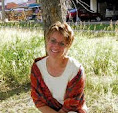Inclusive education and exceptional students
Recently, I was asked to do
a workshop that focused on resources for inclusive education. This was a first for me and proved to be an
interesting challenge. How many books
could I promote that covered a range of ideas about diverse students in today’s
classrooms? What should a good book that
portrays a child with exceptional needs look like?
This meant doing some
reading of my own about this topic and I found a couple of interesting articles
that provided different criteria for evaluating books for stereotypes about
disabilities specifically. (See list at
the end of posting.)
So, back to which books to
look at…
Nonfiction
Black Book of Colors by Menena Cottin
I promote this one all the
time for many reasons. This is told in
text and Braille about how a young blind boy ‘sees’ or perceives colours. Beautifully designed and very poetic.
Chuck Close: Face Book by Chuck Close
A well known artist, who had
learning issues as a child, also has physical challenges that he’s had to
overcome to pursue this career as an artist.
Again, the format of the book is intriguing and the story inspirational.
She Touched the World: LauraBridgman, Deaf-Blind Pioneer
by Sally Hobart Alexander
Before Helen Keller there
was Laura Bridgman. I hadn't come across
Laura’s story before and thought this was a fascinating look at how Laura paved
the way for blind/deaf people in the 1800s, including Helen.
Fiction
I had a whole slew of fantastic
books but could only focus on a few, due to time constraints.
Crazy Man by Pamela Porter
This novel takes place in
1965 in rural Saskatchewan
How Smudge Came by Nan Gregory
|
Junkyard Wonders by Patricia Polacco
One in a trilogy by Patricia
Polacco about her experiences growing up with learning disabilities. I really enjoyed all three longish picture
books. See also, Thank you Mr. Falker
and The
Art of Miss Chew.
Keep Your Ear On the Ball by Genevieve Petrillo
I really liked this picture
book when I read it last summer. It’s
about a very independent blind boy. When
he starts at a new school the other kids in his class are eager to help him,
but he always says “no thanks”. But when
it comes to playing kick ball, it’s only when the kids work together that they
come up with a solution that gets Davey into the game. After having read some of the various
criteria to use when reviewing books like this, I did question that it’s not
Davey who comes up with the solution but one of this classmates. Having the non-disabled figure out the
problem/solution? is less then desirable.
Out of My Mind by Sharon Draper and Wonder by R.J.
Palacio
Both of these novels blew my
socks off. I loved the two main
characters Melody and Auggie (respectively) and introduced them as if they were
two students that student-teachers could have in their class.
I described who Melody and Auggie are, some
good qualities and the nature of their disabilities. I did eventually introduce the books and
again, a few criteria that they should consider when selecting books like these
for classroom use.
Ten Birds by Cybele Young
This Canadian Governor
General’s award winner is a good classroom tool that cautions about the use of ‘labelling’. Ten birds find ways to cross a river. The
first nine (who are all somehow brilliant) devise ingenious contraptions that
allow them to pass over, under, through the river. Whereas the tenth bird named Needs
Improvement just walks across the bridge that has been there the whole
time. Fantastic illustrations.
Wonderstruck by Brian Selznick
This ‘novelized-graphic
novel’ (or is it, ‘illustrated novel’) includes a deaf girl as a main character
in one of the storylines. I brought this
one in to highlight the interesting format of the book (sections of text are
interspersed with long sections of illustrations with no accompanying text.)
and
Knots On a Counting Rope by Bill Martin Jr. and John Archambault.
I did not recommend this book. Though it tells the story of
a blind, Native American boy, the book is not recommended in The Broken Flute (edited by Beverly Slapin and Doris Seale, 2006) as it
portrays the Native Americans in an inauthentic way. This is a ‘classic’ children’s picture book
that is often used in classrooms. I
wanted to raise awareness about the many issues that need to be considered when
selecting classroom resources.
This link from Smart in the Inside takes you to a pretty comprehensive list of juvenile resources (fiction and nonfiction) about specific learning conditions and disabilities compiled by Kathy Young.
This link from Smart in the Inside takes you to a pretty comprehensive list of juvenile resources (fiction and nonfiction) about specific learning conditions and disabilities compiled by Kathy Young.
Articles
Angharad Beckett (et al.) (2010). ‘Away with the fairies?’ Disability within primary-age children’s literature. Disability & Society, 25:3, 373-386.
Emily Wopper (2011). Inclusive literature in the library and the classroom: the importance of young adult and children’s books that portray characters with disabilities. Knowledge Quest, 39:3, 26-34.
Emiliano C. Ayala (1999). “Poor little things” and “brave little
souls”: the portrayal of individuals with disabilities in children’s literature. Reading
Research and Instruction, 39:1, 103-117.
Stephanie Kurtts and Karen
Gavigan (2008). Understanding
(dis)abilities through children’s literature. Education Libraries, 31:3, 23-31.
Web Resources
Anti-Defamation League
(2005). Evaluating children’s books that address disability.
-good checklist
Today is Nonfiction Blog hosted by Perogies & Gyoza. Stop by for a review of other blogs reviewing nonfiction children's literature.

























2 comments:
This is a very interesting list. We have read many of Patricia Polacco's books and think she has a wonderful point of view. Thanks for sharing! We have bookmarked these to read.
-Reshama
www.stackingbooks.com
Great roundup--I'm going to look for BLACK BOOK OF COLORS and CHUCK CLOSE. WONDER is one of my fav books of the past year. Thanks for sharing!
Post a Comment